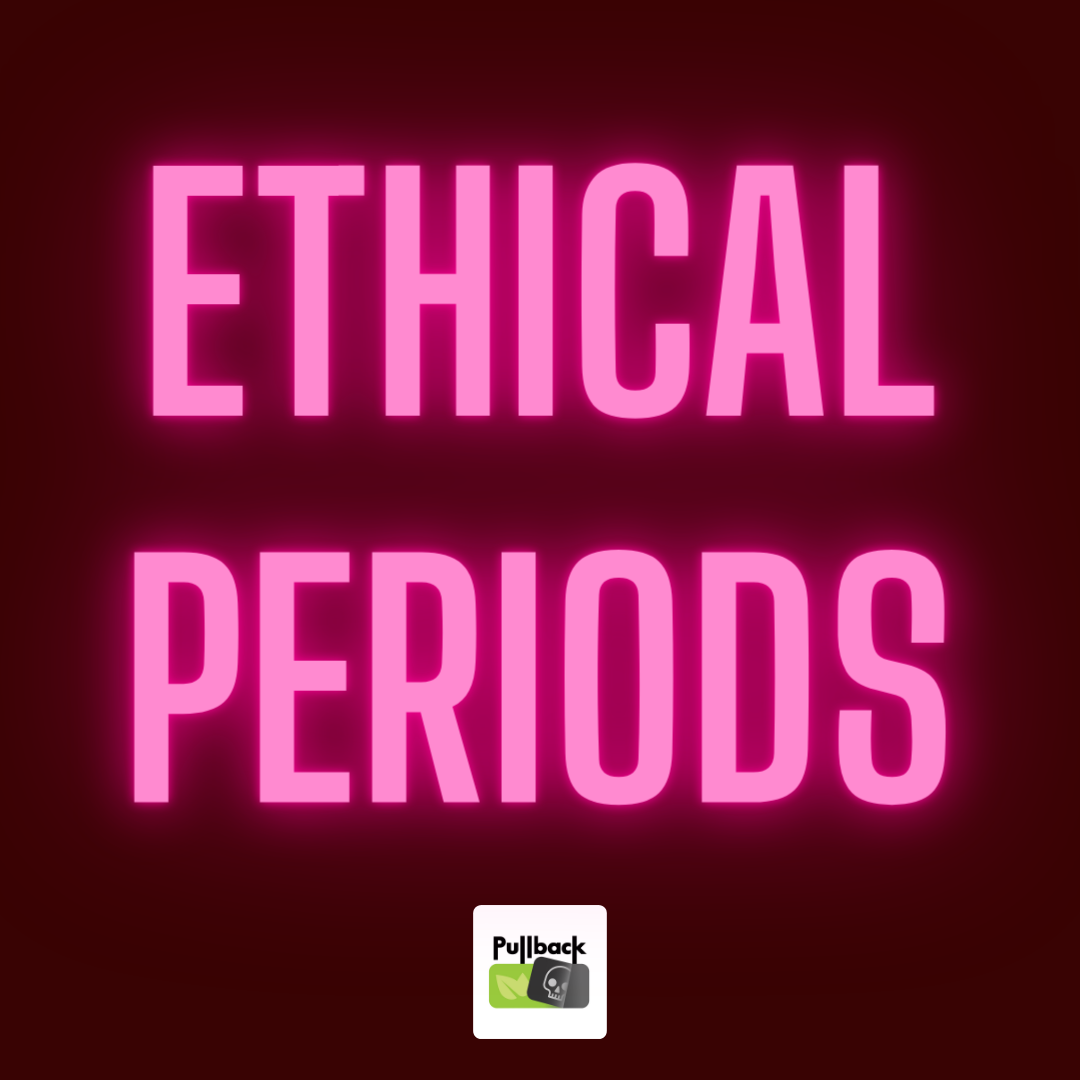Episodes 51 and 52 - Ethical Periods
Menstruation is a gender equality issue. Not all women menstruate, and not all who menstruate are women—trans people, we see you—but periods are a big part of life for those that experience it. Menstruation is a source of shame and unfreedom for many and affordability challenges can make it difficult for some to access safe menstrual products.
Period Positivity
Period positivity is about destigmatizing menstruation. Plan International found that 48% of girls in the UK feel embarrassed by their period. That same report found that some girls actually think periods are blue, thanks to advertisements that use blue liquid in product demonstrations.
12% of girls surveyed by Plan International UK had been told not to talk about their periods in front of their mothers. 20% of girls in rural India leave school after they get their first period.
The Free Bleeding Movement
People might remember a story from 2015 about Kiran Gandhi, the woman who ran a marathon on her period without a tampon. The free bleeding movement is a reaction to the social shame around menstruation. Most free bleeders also point out the unsustainability of disposable period products. Free bleeding as a form of protest aims to de-stigmatize menstruation as well as to bring attention to period poverty.
Period Poverty
Girls around the world who can’t afford period products miss school or work during their menstrual cycles. So, period poverty is a very real source of inequality. Plan International’s study found that 10% of girls in the UK have been unable to afford period products and 12% has had to improvise due to affordability issues.
More information on period poverty can be found here and here. Period stigma is a part of the reason girls and people who menstruate around the world are not completing secondary school. In addition to hurting folks leaving school early, it also negatively affects local economies. Normalizing this conversation and educating everyone in these issues, not just people who menstruate, is a hugely important factor in combating some of the struggles people face in gaining access to safe and clean products in a welcoming environment. Period myths are hurting folks around the globe.
Ethical Challenges with Periods
Plastic Pollution
People who menstruate have approximately 500 periods in their lifetime. If we use disposable menstrual products, that means using more than 11,000 disposable menstrual products over their lifetime. (Or 250-300 per year). Approximately 20 billion disposable menstrual products go to landfill annually. Most menstrual pads are 90% plastic.
Flushing
Flushing menstrual products can create harmful sewage blockages. And even when it doesn’t, menstrual products that are flushed often end up in the oceans. Sewage debris, which includes menstrual products, make up about 9% of litter on British beaches. The Marine Conservation Society has found that there are an average 4.8 pieces of menstrual waste per 100 metres of beach in the UK.
Plastic-free Periods
Why plastic-free?
In addition to the environmental benefits, switching to reusables is cheaper. Over your lifetime, you can reduce your spending on period products by 94% if you switch from disposables to reusables. Reusables are less common than disposable menstrual products. Stigma, lack of awareness, and inaccessibility are the three biggest barriers to the uptake of reusable period products.
Plastic-free tampons
Conventional tampons are made from rayon polypropylene, and polyethylene. And a quick reminder that even if the tampon applicator is made from bio-plastics, that is not a real solution to the plastics crisis.
You can get plastic-free cotton tampons, although these are still disposable. TOTM, for example, produces organic cotton tampons in paper wrapping. They aren’t cheap, though: at £3/tampon, a full cycle would cost you about £42 ($73 CAD). There are much cheaper cotton tampons available—you can get them for under $15.
If tampon applicators are really important to you, there are reusable versions available.
Menstrual Cups
Menstrual cups are bell- or disk-shaped cups that you insert into the vaginal canal to collect menstrual blood. Think of them like a tampon that you can leave in for longer, empty, and reuse. You can leave a menstrual cup in for up to 12 hours. A typical menstrual cup will cost about $35-40 CAD. Menstrual cups are typically made from medical-grade silicone. Here is an article with tips for how to clean your menstrual cup.
There are different menstrual cup sizes. If you find that your menstrual cup is leaking, you may need a bigger size. (Although sometimes it just means the holes are clogged and the cup can’t get a proper seal). There are cups designed specifically for teens.
Reusable pads and period underwear
Conventional pads are made from non-biodegradable, petroleum-based polyacrylate polymer gels and lined with plastic. They are packaged separately in plastic.
You can buy reusable pads and pantyliners, which are usually made from organic cotton. Another alternative is period underwear, which is just like regular underwear but with a gusset that is built to absorb menstrual fluid. Some brands of period underwear include Knix, Aisle, Wuka, and Thinx.
Knix is a Toronto-based company. Their period underwear ($27-39 CAD depending on the type) is made from a layer of cotton and two layers of polyester. Knix sizes up to 4XL. Knix underwear absorbs 1-8 tampons worth of period blood.
As a company, Knix could be better. Good On You gives it a rating of “Not Good Enough” because there is very little evidence that the company uses eco-friendly materials or takes efforts to reduce its carbon or water use. Good On You also has concerns about Knix’s labour practices, although the company is taking some steps on this. Thinx also received a “Not Good Enough” rating from Good On You, for similar reasons.
The Vancouver-based Aisle is not yet in the rating system, but they seem more committed to environmental sustainability. They are not in the Good On You directory. I like the fact that they explain their materials on their website and are transparent about the factories where their pads and underwear are manufactured.
Other options
Don’t put sea sponges in your snatch; it’s a recipe for infection.
Call to Action
Moon Time Sisters is a nonprofit that helps young people in northern and remote communities access menstrual products. Check them out!

